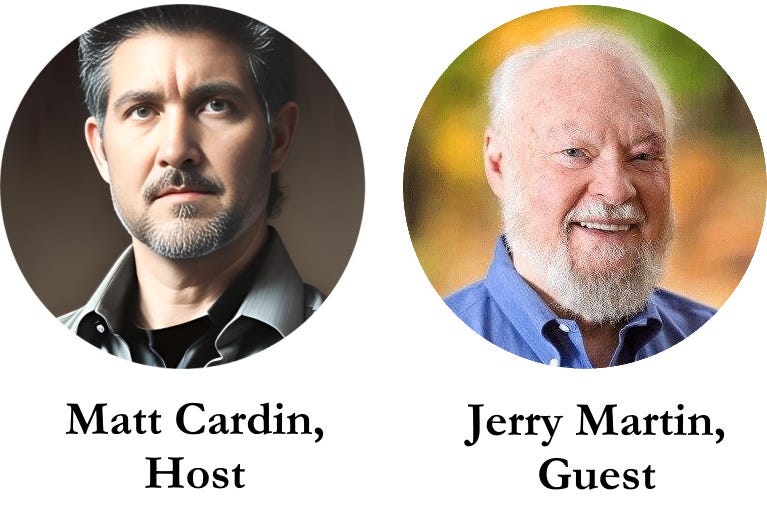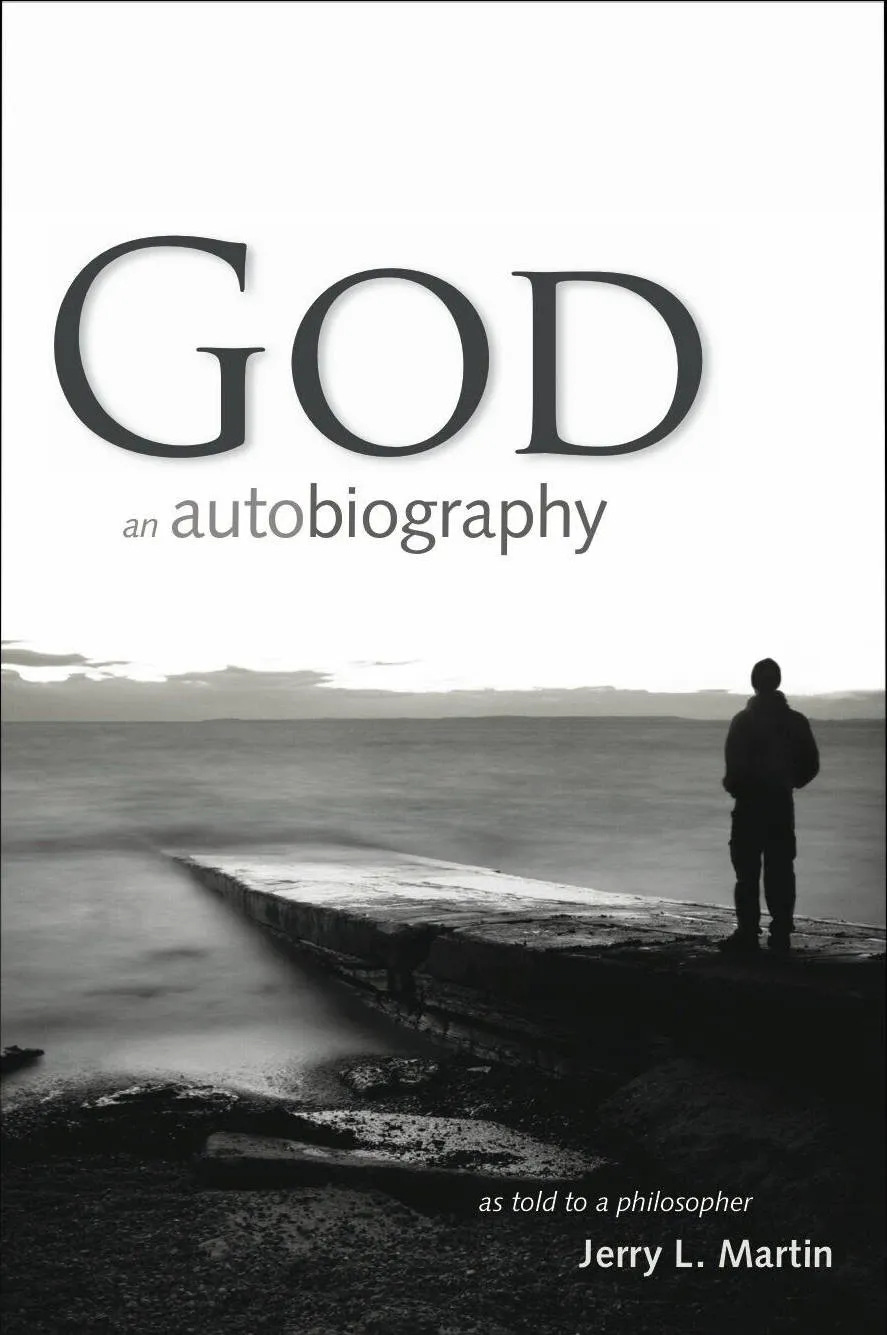You Are an Instrument of Something Higher: A Conversation with Jerry Martin (Podcast Transcript)
An expanded transcript of the Living Dark podcast interview
Dear Living Dark readers,
What follows is the transcript of my podcast interview with Jerry L. Martin, author of God: An Autobiography as Told to a Philosopher. It is not, however, simply a raw transcript. I have significantly enhanced it for paying subscribers to this newsletter. This is the same approach that I will use for all future podcast transcripts.
The enhancements are of two types, one simple and the other more profound. The first shows up on the level of words and sentences. As you know, a raw transcript contains all the ums, ers, sentence fragments, and other paralinguistic detritus that is generally fine in verbal speech, but that interferes with reading. I have cleaned up these things to produce a transcript that is smoothly readable.
The second type of enhancement shows up on the level of prose style, and more than that, in the actual expression of ideas, including the perfecting of ideas stated in the original podcast and the addition of several that are new to this version. What you hold in your hands (figuratively speaking) represents not so much a simple transcript of the podcast episode as a companion to it, and even an expansion of it. When I went to create it, I approached the task as its own special project, and I did so with a specific model in mind: The Power of Myth, both the classic PBS series and its bestselling companion book of the same title. When Bill Moyers and Joseph Campbell got together to edit the transcripts of their recorded conversations at Skywalker Ranch, what they did was so much more than a mere clean-up job to tweak the text. Instead, they went deep into the transcripts and performed substantive editing to produce fully book-worthy material. The final result, as anyone knows who has both read the book and watched the series, is not so much a transcript as an alternate version, created specifically for effectiveness on the printed page. That’s the kind of thing I set out to produce here.
I laid out this plan to Jerry when I sent him the partially edited draft, inviting him to edit with abandon, with the goal of perfecting his audio/video-recorded words in this alternate textual form so that they would say exactly what he intended them to say, now that he was able to re-engage with them and recast them with the benefit of calm reflection and hindsight. I also gave myself the same permission in transforming my own side of the conversation. I’m pleased with how that turned out on both sides.
Two more things before moving on to the thing itself:
First, for this textual version I added, and Jerry answered, a question that I did not ask him in the podcast version: Why does he think God picked him, an agnostic philosophy professor with neither the specific training, nor the professional career, nor a personal religious interest or outlook, that would seem to be conducive to communicating to the world a “revelation about revelations”? You’ll find this question and Jerry’s response clearly marked about four-fifths of the way through the text.
Second, the transcript is quite long—nearly 11,000 words—so those of you who are accustomed to reading Living Dark posts in your email will need to click through to the website version for the full thing.
I hope you like the way this turned out. I also hope the conversation in this alternative, enhanced form engages you on a deep level.
God’s Autobiographer: A Conversation with Jerry L. Martin
Adapted from episode 1 of the Living Dark Podcast (April 2023)
INTRODUCTION
We’re probably all familiar with the old joke: When you talk to God, that’s prayer. When God talks to you, that’s schizophrenia. For the inaugural episode of the Living Dark Podcast, published in April 2023, I decided to record a conversation with a friend whose work falls squarely in the middle of the epistemologically and culturally perilous territory defined by that joke.
It was around 2010 that I first became aware of Jerry L. Martin and his book in progress titled God: An Autobiography. At the time I was deep into blogging at my now-defunct website Demon Muse, and I was developing my book A Course in Demonic Creativity from those materials. So thoughts about the experience of perceived communication from an external psychological or spiritual source were very much on my mind. And when I began reading excerpts and even entire chapters from the God book at its website, I was transfixed.
The official description that accompanied the book when it was eventually published in 2016 as God: An Autobiography, as Told to a Philosopher indicates why:
The voice announced, “I am God.” For Jerry Martin, that encounter began a personal, intellectual, and spiritual adventure. He had not believed in God. He was a philosopher, trained to be skeptical—to doubt everything. So his first question was: Is this really God talking? There were other urgent questions: What will my wife think? Why would God want to talk to me? Does God want me to do something? He began asking all the questions about life and death and ultimate things to which he—and all of us—have sought answers: Love and loss. Happiness and suffering. Good and evil. Death and the afterlife. The world’s religions. The ways God communicates with us. How to live in harmony with God. God: An Autobiography tells the story of these mind-opening conversations with God.
My fascination with this book and its author was increased early on when I learned that, in fact, Jerry Martin was a respected member of the intellectual establishment. Prior to the commencement of his God conversations, he spent 15 years as a tenured philosophy professor at the University of Colorado at Boulder, where he also served as chair of the philosophy department. In the late 1980s and early 1990s, he worked for the National Endowment for the Humanities and even filled the role of acting chairman. In the late 1990s and early 2000s, he was a prominent figure in the national higher education landscape, serving as president of a Washington, D.C.-based policy organization that had been founded by such figures as Lynne Cheney, Saul Bellow, and David Riesman to support liberal arts education. At one point he was called upon to testify before Congress. As stated pithily on the back cover of God: An Autobiography, “He stepped down from that career to write this book.”
Upon discovering Jerry’s book-in-progress, I got involved in some of the online communications with him that appreciative readers were conducting through his website, and it swiftly became evident that he and I shared a similar set of concerns, although my own experiences have imparted a decidedly darker cast to my thoughts and writings about the perception of divine and daemonic communication. Jerry and I also began conversing through Facebook, and I found him to be a forthrightly kind and generous-spirited correspondent.
Which brings me to the current conversation. When I decided it was time to act on the idea for a podcast that I had been harboring since the launch of the Living Dark newsletter in the autumn of 2022 (originally under the title Living into the Dark), one of the first people I thought to contact was Jerry. I have regarded his book as an important one since before it was published, and his personal story as a fascinating one since I first learned of it. The account of how this book came to be written, and of what exactly Jerry’s “conversations with God” were like, and of what the book actually says about God, the world’s religions, and individual people’s relationships with the divine; and the question of the book’s significance for our collective understanding of religion and spirituality at this time—all of this adds up to making Jerry the ideal guest on a podcast linked to a blog/newsletter that is, in very large part, about the experience of feeling as if you are in relationship with an invisible, autonomous, intelligent creative force and source that gives direction and meaning to your life.
I will close this introduction by noting that I deliberately chose to keep my own side of the conversation you’re about to read to a minimum. I wanted to give Jerry plenty of time and room to explain his fascinating experiences and the book they ended up producing. I hope you find the story—not only of Jerry, but of the God who spoke to him—as valuable and absorbing as I do.




